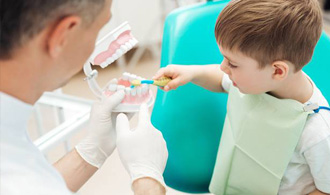Hillsboro Fluoride Treatment
 Parents want nothing more than to give their kids more reasons to laugh and smile. Helping your kids keep their smiles whole and healthy throughout dental development is essential. At The Dentists at Orenco for Kids, we’re here to help Hillsboro parents and kids develop healthy smiles in a dental office where parents feel welcome and kids feel right at home. One of the many kid-friendly dentistry services we provide to young patients is fluoride treatment. These oral or topical treatments help kids strengthen their teeth to reduce the risk for tooth decay and dental wear. Best of all, it’s an easy and painless treatment method that can help your child build positive associations with the dentist and learn to love caring for their smiles. Call our Hillsboro team to find out more or schedule an appointment with us. We look forward to helping kids with all of their oral health care needs.
Parents want nothing more than to give their kids more reasons to laugh and smile. Helping your kids keep their smiles whole and healthy throughout dental development is essential. At The Dentists at Orenco for Kids, we’re here to help Hillsboro parents and kids develop healthy smiles in a dental office where parents feel welcome and kids feel right at home. One of the many kid-friendly dentistry services we provide to young patients is fluoride treatment. These oral or topical treatments help kids strengthen their teeth to reduce the risk for tooth decay and dental wear. Best of all, it’s an easy and painless treatment method that can help your child build positive associations with the dentist and learn to love caring for their smiles. Call our Hillsboro team to find out more or schedule an appointment with us. We look forward to helping kids with all of their oral health care needs.
Why Kids Need Fluoride
 During the development of healthy tooth structures, patients need to receive adequate levels of ingested fluoride to create strong, healthy enamel. Once teeth erupt from the gum line, topical fluoride is essential to keep the enamel strong, healthy, and free from decay. Fluoride is a mineral that helps to strengthen smiles. Every day, smiles are constantly going through demineralization and remineralization. As acidic bacteria, plaque, and foods and beverages attack teeth, minerals are removed from tooth enamel. When you brush teeth with fluoridated toothpaste or use other fluoride treatments, these minerals are replaced to keep teeth strong. When there are not adequate levels of fluoride and other minerals to prevent demineralization, the result can be decay and softening of enamel, which can lead to dental wear, chips, and cracks.
During the development of healthy tooth structures, patients need to receive adequate levels of ingested fluoride to create strong, healthy enamel. Once teeth erupt from the gum line, topical fluoride is essential to keep the enamel strong, healthy, and free from decay. Fluoride is a mineral that helps to strengthen smiles. Every day, smiles are constantly going through demineralization and remineralization. As acidic bacteria, plaque, and foods and beverages attack teeth, minerals are removed from tooth enamel. When you brush teeth with fluoridated toothpaste or use other fluoride treatments, these minerals are replaced to keep teeth strong. When there are not adequate levels of fluoride and other minerals to prevent demineralization, the result can be decay and softening of enamel, which can lead to dental wear, chips, and cracks.
How Kids Get Fluoride Naturally
 Many children receive fluoride from drinking water that helps as their teeth develop. Fluoride also occurs naturally in a variety of foods. If we’re concerned your child isn’t receiving adequate levels of ingested fluoride during dental development, we’ll work with you to plan for treatment using fluoride supplements. More kids are drinking bottled water, which often makes it necessary for us to provide fluoride supplements to replace the minerals they would receive by drinking tap water and ensure the development of whole, healthy smiles.
Many children receive fluoride from drinking water that helps as their teeth develop. Fluoride also occurs naturally in a variety of foods. If we’re concerned your child isn’t receiving adequate levels of ingested fluoride during dental development, we’ll work with you to plan for treatment using fluoride supplements. More kids are drinking bottled water, which often makes it necessary for us to provide fluoride supplements to replace the minerals they would receive by drinking tap water and ensure the development of whole, healthy smiles.
Oral & Topical Fluoride Treatments
 Oral fluoride therapy is really only recommended for young children who are still developing their primary or adult teeth. Once teeth erupt, topical therapies are necessary. For some kids, we may recommend higher levels of fluoride in at-home hygiene products or professional fluoride applications during six month dental checkups. We don’t want kids to have too much fluoride exposure, so it’s important to discuss any additional oral or topical fluoride treatments you’re using. This allows us to plan for safe and effective fluoride treatment.
Oral fluoride therapy is really only recommended for young children who are still developing their primary or adult teeth. Once teeth erupt, topical therapies are necessary. For some kids, we may recommend higher levels of fluoride in at-home hygiene products or professional fluoride applications during six month dental checkups. We don’t want kids to have too much fluoride exposure, so it’s important to discuss any additional oral or topical fluoride treatments you’re using. This allows us to plan for safe and effective fluoride treatment.
Keeping Kids Smiling with Preventive Care
During your child’s regular six month dental checkups and teeth cleaning appointments, we will help you determine whether or not they need to receive fluoride supplements or topical treatments to assist them in avoiding cavities. Many children do just fine with the fluoride they receive from drinking water and their daily tooth brushing routine. If your little one does need fluoride treatment, we’ll be happy to provide these services.
Fluoride Treatment FAQs
 As a parent, you want nothing more than to make sure your child is healthy and happy. Fluoride treatment for kids can keep them cavity-free, giving them something to smile about. However, odds are you may have heard rumors that fluoride isn’t safe or can cause harm. This is why your pediatric dentist has taken the time to answer some of the questions about fluoride that we get asked the most frequently.
As a parent, you want nothing more than to make sure your child is healthy and happy. Fluoride treatment for kids can keep them cavity-free, giving them something to smile about. However, odds are you may have heard rumors that fluoride isn’t safe or can cause harm. This is why your pediatric dentist has taken the time to answer some of the questions about fluoride that we get asked the most frequently.
What Are the Benefits of Fluoridated Water?
No matter your age, drinking tap water fortified with fluoride can significantly decrease your risk of developing cavities. Fluoride deposits minerals onto the enamel of the teeth that makes them stronger in the constant battle against decay. Simply switching from bottled water to tap water has been shown to reduce decay in children and adults by up to 25%. In fact, because of its ability to prevent tooth decay, the Centers for Disease Control and Prevention named community water fluoridation as one of top ten greatest public health achievements of the 20th century.
Is Fluoride Safe?
Fluoridated water, toothpaste, and even topical or oral fluoride treatments are all perfectly safe and effective ways of making your little one’s smile grow up strong and healthy. Water in public sources has been fluoridated for about 70 years, and research has shown that people in areas with fluoridated water generally have fewer cavities than those without fluoridated water.
Can My Child Have Too Much Fluoride?
When it comes to fluoride, there can be too much of a good thing. If your son or daughter accidentally ingests too much fluoride during dental development, it can lead to a condition known as fluorosis. This completely harmless condition can cause tiny white spots to appear on your child’s permanent teeth later on in life. While these marks are simply cosmetic and can be removed with treatments like professional teeth whitening, you can avoid them by supervising your child while they brush their teeth to make sure they don’t accidentally swallow too much of it.
Should My Child Use Fluoride Toothpaste?
If your child is younger than three years old, you should use a smear of fluoride toothpaste no longer than a grain of rice to clean their teeth. For children aged three to six, use a pea-sized dab of fluoride toothpaste. Up until your little one is older than six, watch them as they brush to ensure they don’t ingest any toothpaste.
Should My Child Use a Fluoridated Mouth Rinse?
Fluoride mouthwash, coupled with fluoride toothpaste and drinking tap water, can significantly strengthen your teeth. However, the American Dental Association does NOT recommend that children under the age of six rinse with a fluoridated mouthwash. This is because many children younger than six have not fully developed their swallowing reflex. As a result, they may accidentally swallow the mouth rinse and are at an increased risk of developing fluorosis.
